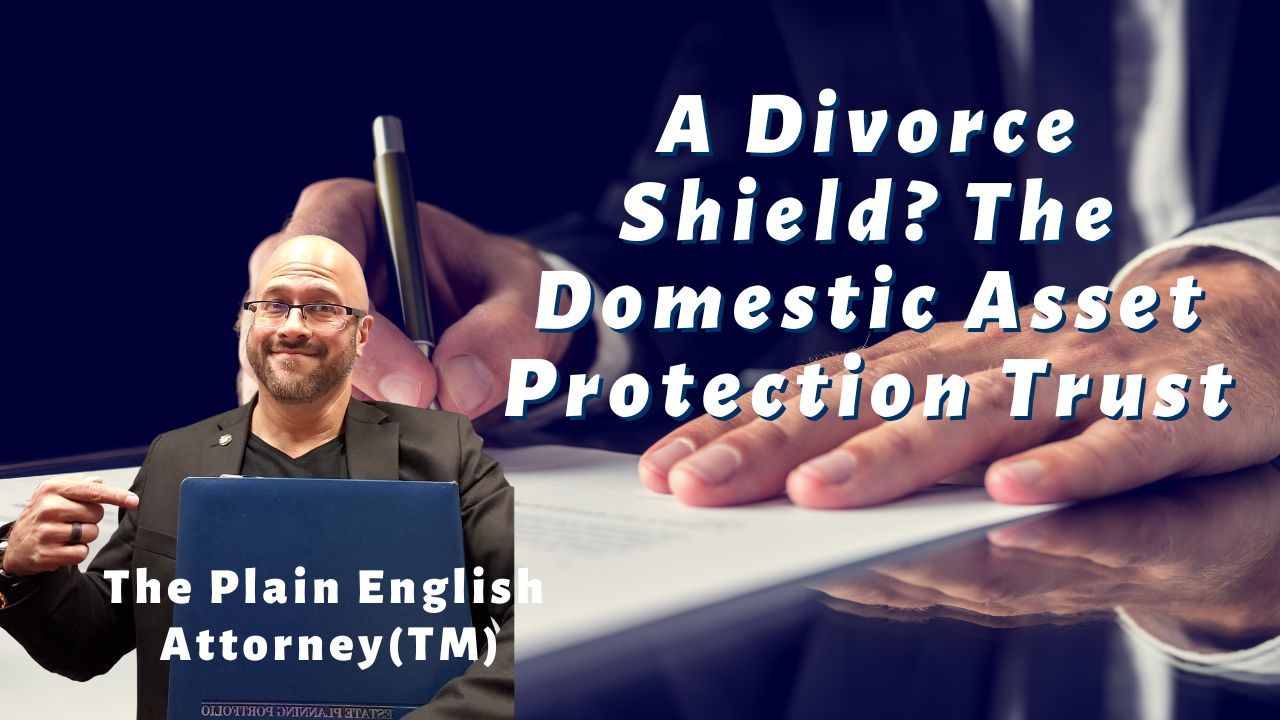A Divorce Shield? The Domestic Asset Protection Trust
Apr 10, 2023
Recently, I've seen a trend of people wanting to protect their assets from a potential divorce as part of their life planning before getting married. While premarital agreements have a place, there are some ways to get around some or all of the terms in an agreement, and people want to be sure. In looking at this question, I do have a book in the works, and one of the big components is a self settled asset protection trust.
Even when it comes to trusts, there’s no magic box that can grant all of your wishes without any consequences, repercussions, or loss of control. I often have to tell this to my estate planning clients when reviewing a revocable living trust as a way to avoid probate court (i.e., government supervision of an estate) and the accompanying costs, delays, potential contests, and loss of privacy that comes with it. You can avoid all of these downsides with a revocable living trust for all of the assets in the trust. It can even protect your eventual beneficiaries from lawsuits, bankruptcy, divorcing spouses, and loss of disability benefits and Medicaid, at least before they actually receive the inheritance. And it does this while leaving you in control of your own accounts, real estate, and other possessions. Even with all of that, the inevitable questions come up, the chief one being, “And it protects me from lawsuits and divorce, right?”
No, it doesn’t. Why not? Because you are left in control of the trust, can make changes, and even dissolve the trust. You can spend your money as you want. As long as you are alive and competent, you are also the trustee and can call all of the shots. It is the combination of that control and authority coupled with the fact that you are the beneficiary that lets a court see right through the trust in a lawsuit to hold you financially responsible.
So, no, there is no magic box you can put your own assets into, enjoy all of the benefits of the wealth being yours, and then also call all of the shots. But a Domestic Asset Protection Trust comes pretty darn close. This is especially true when it comes to divorce protection because it would also be working in tandem with some or all of the other techniques like a pre-marital agreement, so by putting your separate assets into this trust before marriage and even during marriage in compliance with the prenup, they become highly protected, even from divorce courts. So what exactly makes this protective trust different from the typical revocable living trust? A Domestic Asset Protection Trust is:
Irrevocable: Once enacted, the trust can't be changed.
Trustee: The trustee must be someone else who is not beholden to you, which means spouses, children, siblings, and employees are not eligible.
Beneficiary: You have to be the sole beneficiary, and it is typically only your own assets being put into the trust.
Distributions: The trustee has to have the authority to distribute income, principal, and other benefits to you, either in their sole discretion or according to an "ascertainable standard," such as only for your health, education, maintenance, and support.
The different requirements do vary from state to state. Now, the tough part for my own law firm's clients, this trust is not available under North Carolina law. This means the trust would have to be set up in one of the eleven states. For example, the Nevada Domestic Asset Protection Trust laws requires the trust:
- At least one person must be a natural person who resides or is domiciled in Nevada, or a bank or trust company that maintains an office in Nevada
- The trust must be in writing
- The trust must be irrevocable
- The trust must not require that any part of the income or principal of the trust be distributed to the settlor; and
- The trust must not be intended to hinder, delay or defraud known creditors.
So under these requirements, I can work with my clients to get an attorney licensed in Nevada (or another of the ten states that allow Domestic Asset Protection Trusts), but there would need to be a trustee located in that state and usually some assets need to be located in Nevada. To make extra sure, if the client has real estate they want protected, there would likely be much more solid protection by having the real estate be owned by a Nevada LLC or Corporation, and then the shares or interests would be in the Trust.
Putting together the book and going through the research has been interesting, to say the least. I'm hoping to have the book ready for publishing by the end of the summer or earlier. But for now, let me and my law firm know if the Domestic Asset Protection Trust is something you are interested in.
Stay connected with news and updates!
Join our mailing list to receive the latest news and updates from our team.
Don't worry, your information will not be shared.
We hate SPAM. We will never sell your information, for any reason.
